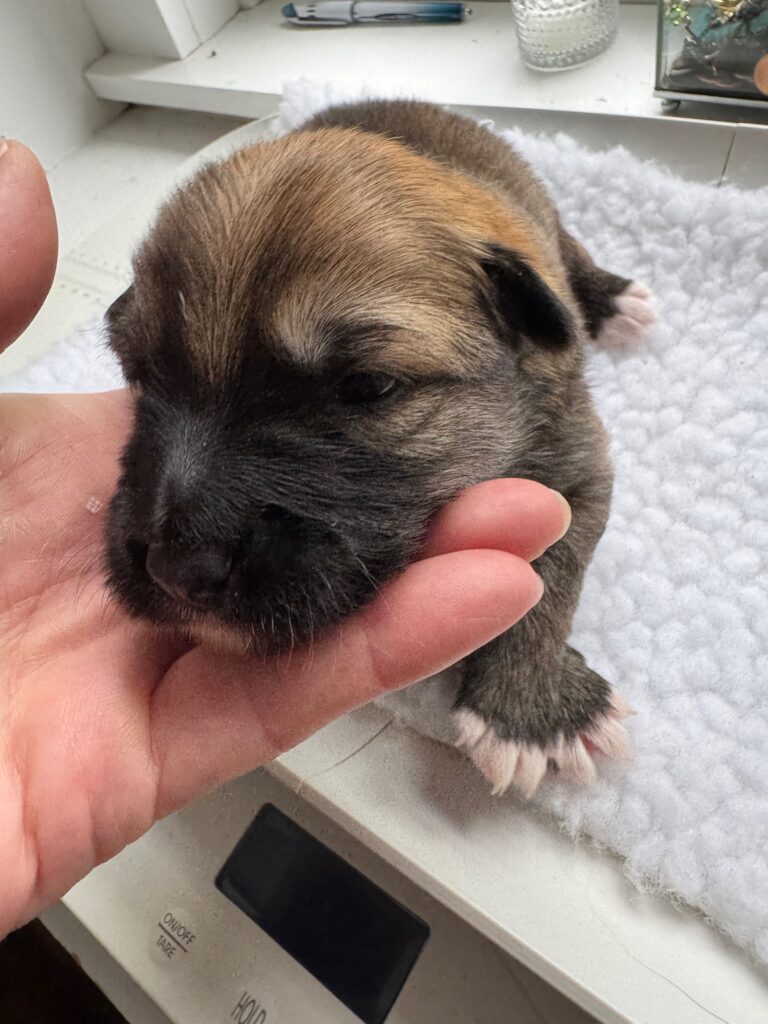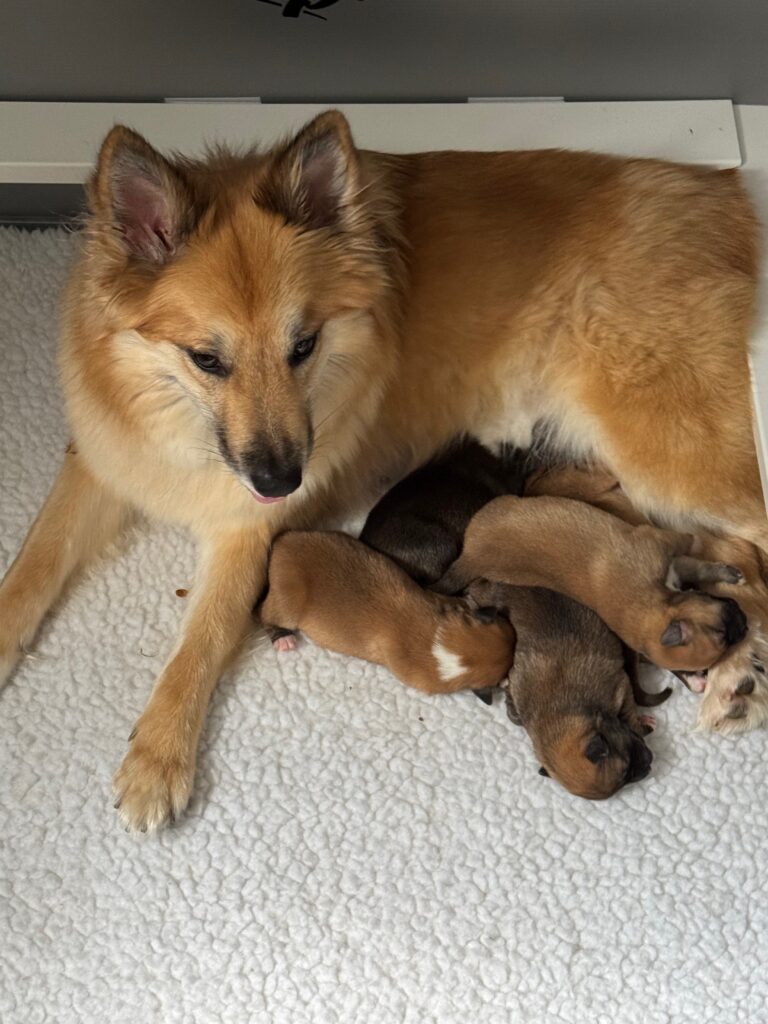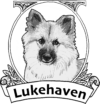Icelandic Sheepdog Puppies
Icelandic Sheepdog Puppies: Growth & Development (0–12 Weeks)
This page is all about Icelandic Sheepdog Puppies and their development over about 12 weeks which is the length of time we like to keep the puppies until they go to their new homes. The gallery below will have pictures of our current litter or will show the last litter depending on when this page is viewed. Our breeding approach is rooted in four foundational pillars: health, sound structure, stable temperament, and genetic diversity. We view every puppy placement as the start of a lifelong partnership grounded in shared values—respect, inclusivity, environmental stewardship, ethical breeding, and social responsibility.

Weeks 1–2: Newborn & Early Sensory Phase
- Birth to ~Day 10: Puppies are entirely dependent on their dam —eyes and ears closed, focused on warmth, nursing, and restful growth.
- Days 10–14: Eyes begin to open; ears follow soon after. Coordinated movement starts—early handling supports bonding and adaptability.


Week 3: Awareness & Early Play
- Improved vision and hearing bring awareness of littermates and surroundings.
- First teeth emerge; gentle play begins.
- This week marks a pivotal boost in social and neurological development.
Weeks 4–5: Weaning & Socialization
- Transition from nursing to puppy mush begins; solid food becomes a new staple.
- Puppies start playful interactions—tail wags, soft barks, and bite‑inhibition practiced with littermates.
- Short supervised environmental exposures help build confidence.
Week 6: Independence & Foundations
- Enhanced coordination, exploration, and playful curiosity emerge.
- Weaning continues; puppies begin to eat independently and explore novel surfaces.
- Introduction to crate basics and brief, gentle car rides lay groundwork for future adaptability.
Week 7: Social Play & Confidence
- Puppies become more exploratory and playful—interacting with toys and littermates across various textures and surfaces.
- Short car rides and crate packets foster calmness and adaptability.
- Note: This age may involve a minor fear sensitivity—gentle exposure is key
Weeks 8–9: Training Foundations & Social Bonding
- Eight weeks marks the ideal time to begin handling routines—grooming, vet visits, very basic training (e.g., sit, come).
- It’s also a critical window for vaccination preparation, socialization with people and safe environments
- Positive reinforcement and nurturing experiences help form strong attachments during this impressionable stage
Weeks 10–12: Refinement & Readiness
- Around 10 weeks, puppies gain confidence exploring new surfaces, sounds, and light challenges—longer car rides, novel environments.
- By 12 weeks, puppies are well-versed in basic handling routines, socialized, and emotionally prepared to transition into their forever homes.
- They have entered pre‑adolescence: curious, confident, and ready for more structured learning
Why We Keep Puppies Until 10 – 12 Weeks
Holding puppies with us until 12 weeks supports several key advantages:
- Extended socialization with littermates and adult dogs within a supportive, value‑driven environment.
- Stabilized behaviors—bite inhibition, resilience to novelty, and confidence are better established.
- Better immune and developmental maturity before exposure to new environments and social groups.
- Allows us to mentor new owners in continuity of care, reinforcing the lifelong partnership we cultivate
Preparing to go Home – Feeding and Nutrition
At Lukehaven, we believe nutrition is a cornerstone of lifelong health. From birth until weaning, our puppies nurse from their dam and receive supplemental puppy mousse as they transition to puppy formulated kibble. We use Royal Canin Mother and Baby Dog mousse and kibble. All our dogs are on a diet of fresh food which we make for them weekly using Farmer’s Dog recipes and nutrients. By 8 weeks of age, our puppies are fully weaned and also begin eating a fresh food diet, the same as their dam.
We feed The Farmer’s Dog—a veterinarian-developed, human-grade fresh food made with balanced nutrients to support healthy growth and prevent orthopedic issues and obesity. This diet provides:
- High-quality protein to build strong muscles
- Balanced calcium and phosphorus levels to support healthy bone and joint development
- Easily digestible ingredients for optimal nutrient absorption
- No artificial preservatives, fillers, or by-products
Fresh food diets like The Farmer’s Dog have been shown to support a shinier coat, healthier digestion, and increased energy levels—important for an active and intelligent breed like the Icelandic Sheepdog.
We strongly encourage new families to continue feeding their puppies a high-quality fresh food diet. Transitioning to lower-quality kibble after adoption can cause digestive upset and deprive your puppy of the balanced nutrients they’ve been thriving on here. If another fresh diet is chosen, we recommend selecting one that meets AAFCO growth standards for puppies and consulting with your veterinarian to ensure optimal nutrition.
We’ll provide each new owner with:
- Detailed feeding guidelines
- Transition instructions if changing brands
- Information on portion sizes based on age and weight
- Tips for safe treat use and avoiding overfeeding
Our goal is to give every Lukehaven puppy a nutritional foundation for a long, healthy life—and that starts from their very first bites.
Next Steps
Our current litter, born June 29, 2025, will be ready to join their new families at 10-12 weeks—mid‑September. Currently, two male puppies are available and we invite prospective owners whose values align with ours to begin the conversation.
To explore puppy placement and learn more about our community‑centered, ethically grounded breeding philosophy, please complete our puppy application or contact us directly via the website
